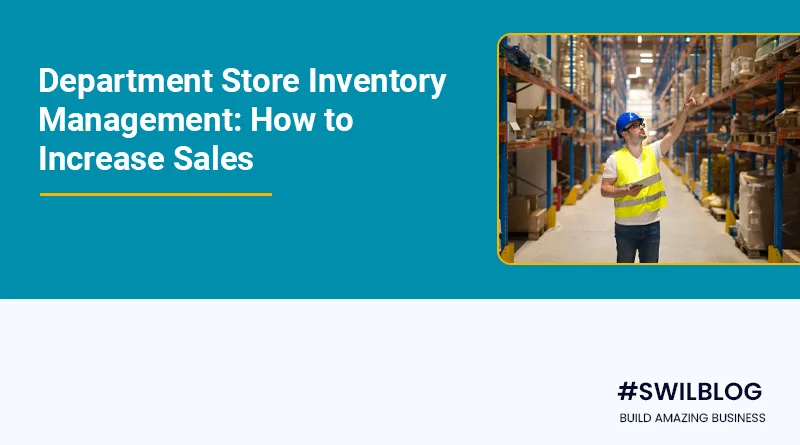Inventory management is one of the most important aspects of a business. It’s essential for retailers of all sizes to keep enough inventory on hand to meet customer demand and avoid excess physical inventory that can lead to lost sales.
In this blog post, we’ll discuss the basics of inventory management and how it can benefit department store owners.
We’ll also discuss tips for planning and executing an effective inventory system for your store and some common mistakes when inventory is managed poorly. Let us help you manage your inventory successfully to keep up with the competition!
Article Content-
- The basics of inventory management
- Why is inventory management important?
- How to Determine the Right Level of Inventory for a Department Store
- What are the benefits of effective inventory management for department stores?
- Tips for proper inventory planning and execution for departmental stores
- Common Mistakes to Avoid When Managing Inventories for Departmental Stores
- Frequently Asked Questions
- Conclusion
The basics of inventory management
To increase sales and stay competitive, it is important to have an inventory management system in place. This system will help you reach sales goals and remain within budget. Here are a few key steps to effective inventory management:
- Establish inventory level goals and objectives, including specific dates by which you hope to achieve the goal.
- Use an RFID scanner that tags all newly added items to keep track of inventory levels.
- Determine realistic sales deadlines and how much product will be withdrawn each week or month to meet these deadlines while remaining within budget.
- Define what items are considered stock versus non-stock.
- Track inventory levels by SKUs or items using a cash drawer that tracks sales by individual items or SKUs (stock-keeping units).
- Estimate the time it will take to sell an item based on experience and current market conditions (eBay is a great resource).
- Perform inventory
Why is inventory management important?
Department store owners know that inventory management is important for several reasons. Taking the right steps can reduce costs, increase profits, and improve customer service.
In addition, inventory management can help avoid waste by ensuring that the right amount of product is available at all times. To succeed with inventory management, it’s important to understand how it works and apply the right strategies.
Forecasting demand is a crucial part of inventory management and is made using past data to predict future demand. Additionally, inventory management ensures that the right amount of product is always available.
By following these simple steps, you can ensure your store runs smoothly and efficiently and maximise profits.
How to Determine the Right Level of Inventory for a Department Store
Inventory management is critical for any business, but it’s especially important for department stores. To boost profits and reduce expenses, it’s important to determine the right amount of inventory for your business. To do this, use historical data, and balance customer needs with company resources.
Remember, the right amount of inventory depends on various factors, including sales volume and product demand. Ensure you have the right tools and procedures to keep your inventory levels consistent and within your budget.
Lastly, inventory management is essential for all businesses, but it’s especially important for department stores. Following these simple tips can keep your business running smoothly and boost profits.
What are the benefits of effective inventory management for department stores?
A good inventory management system is essential for a successful department store. It allows for accurate forecasting and ordering, resulting in increased sales. Ensuring an inventory management system is effective requires a good understanding of the different benefits that it offers.
A good inventory control system should feature automated systems that help you track stock levels effectively. It should also include a system that helps you identify and correct inefficiencies in your inventory as soon as they are spotted.
Poor inventory management can lead to wasted resources, incorrect assumptions about customer demand, and more expensive recorders.
Following a sound inventory management system ensures that your department store remains successful for years to come.
Tips for proper inventory planning and execution for departmental stores
When it comes to inventory management for department stores, proper forecasting is key. By doing this, you’ll be able to ensure that you’re always prepared for peak season demand.
Additionally, please use the float, which allows you to purchase items only when they reach the sale threshold.
By following a cycle, you’ll be able to keep track of stock levels and avoid purchasing items you may not need. Proper inventory management is essential for a successful department store, so keep these tips in mind.
Common Mistakes to Avoid When Managing Inventories for Departmental Stores
Regarding inventory management, it is important to avoid making common mistakes. One of the most common is oversupply, which can lead to excess inventory that needs to be disposed of. This process is costly and time-consuming, not to mention frustrating.
To avoid this, keep track of the stock levels in each department, order products as needed, and avoid putting items on the floor or stacking them high—additionally, order products from wholesalers or manufacturers in bulk when possible to save on shipping costs.
Finally, ensure you know when an item is low and order it to avoid running out of stock. These simple tips can increase sales and keep your inventory management system running smoothly.
Frequently Asked Questions
Here are some tips for managing inventory in a department store: -Analyse inventory levels weekly or daily to ensure that stock is adequate to meet customer demand. -Create order guides and tracking sheets to help keep track of items being ordered and in stock. -Limit the inventory a store carries to avoid high storage costs. -Remove excess inventory from the store occasionally to reduce the amount of unnecessary space taken up.
There is no definitive answer, as it depends on the specific department store in question. Some discount codes or marketing strategies may work better than others.
For department stores, inventory management typically involves forecasting future purchase needs and creating a store inventory plan that considers current sales data.
The inventory management system aids in this by keeping track of items that have been sold, are on sale, or are in the process of being sold.
Conclusion
To increase sales and keep your store running smoothly, it is important to have effective inventory management. By understanding the basics of inventory management, you can make informed decisions about how much inventory to keep on hand and plan inventory transactions to maximize profits. Read the blog for helpful tips on inventory management for your store!








